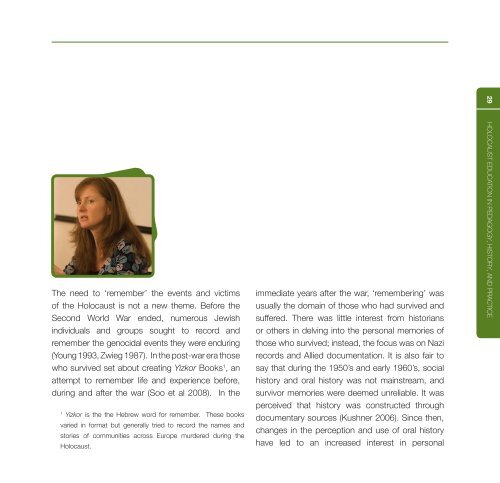2kNreeJ
2kNreeJ
2kNreeJ
Create successful ePaper yourself
Turn your PDF publications into a flip-book with our unique Google optimized e-Paper software.
The need to ‘remember’ the events and victims<br />
of the Holocaust is not a new theme. Before the<br />
Second World War ended, numerous Jewish<br />
individuals and groups sought to record and<br />
remember the genocidal events they were enduring<br />
(Young 1993, Zwieg 1987). In the post-war era those<br />
who survived set about creating Yizkor Books 1 , an<br />
attempt to remember life and experience before,<br />
during and after the war (Soo et al 2008). In the<br />
1<br />
Yizkor is the the Hebrew word for remember. These books<br />
varied in format but generally tried to record the names and<br />
stories of communities across Europe murdered during the<br />
Holocaust.<br />
immediate years after the war, ‘remembering’ was<br />
usually the domain of those who had survived and<br />
suffered. There was little interest from historians<br />
or others in delving into the personal memories of<br />
those who survived; instead, the focus was on Nazi<br />
records and Allied documentation. It is also fair to<br />
say that during the 1950’s and early 1960’s, social<br />
history and oral history was not mainstream, and<br />
survivor memories were deemed unreliable. It was<br />
perceived that history was constructed through<br />
documentary sources (Kushner 2006). Since then,<br />
changes in the perception and use of oral history<br />
have led to an increased interest in personal<br />
29 HOLOCAUST EDUCATION IN PEDAGOGY, HISTORY, AND PRACTICE


